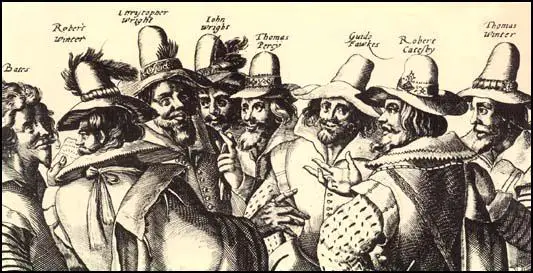Everard Digby
Everard Digby was born in about 1576. Although his parents were Roman Catholics they managed to avoid detection and did not suffer from persecution.
In 1596 Digby married Mary Mulsho, the daughter of William Mulsho, a wealthy Protestant family from Gayhurst. This enabled him to enter the royal court. He took little interest in politics and devoted his time to hunting, horses and hawking.
Digby met the Jesuit priest John Gerard in 1599. The two men became close friends and soon afterwards Digby became converted to the Catholic religion.
In 1605 Robert Catesby devised the Gunpowder Plot, a scheme to kill James and as many Members of Parliament as possible. Catesby planned to make the king's young daughter, Elizabeth, queen. In time, Catesby hoped to arrange Elizabeth's marriage to a Catholic nobleman. Catesby recruited Everard Digby to join the conspiracy and he agreed to provide £1,500 to help pay for the plot.
Catesby's plan involved blowing up the Houses of Parliament on 5 November. This date was chosen because the king was due to open Parliament on that day. At first the group tried to tunnel under Parliament. This plan changed when a member of the group was able to hire a cellar under the House of Lords. The plotters then filled the cellar with barrels of gunpowder. Guy Fawkes was given the task of creating the explosion.

Robert Catesby planned to make the king's young daughter, Elizabeth, queen. In time, Catesby hoped to arrange Elizabeth's marriage to a Catholic nobleman. It was Everard Digby's task to kidnap Princess Elizabeth from Coombe Abbey.
One of the people involved in the plot was Francis Tresham. He was worried that the explosion would kill his friend and brother-in-law, Lord Monteagle. Tresham therefore sent Lord Monteagle a letter warning him not to attend Parliament on 5 November.
Lord Monteagle became suspicious and passed the letter to Robert Cecil, the king's chief minister. Cecil quickly organised a thorough search of the Houses of Parliament. While searching the cellars below the House of Lords they found the gunpowder and Guy Fawkes. He was tortured and he eventually gave the names of his fellow conspirators.
Everard attempted to flee the country but was captured at Dudley. He was the only one of the conspirators to plead guilty. He gave several reasons for his involvement in the Gunpowder Plot. This included his Roman Catholic beliefs, his friendship with Robert Catesby and the king's broken promises in regard to religious toleration.
Everard Digby, along with Robert Wintour and Thomas Bates, were executed on 30th January, 1606. Digby was hanged for only a short period and was still alive when he was disembowelled.
Primary Sources
(1) Everard Digby, confession (November 1605)
For some good space I could do nothing, but with tears ask pardon at God's hands for all my errors, both in actions and intentions in this business, and in my whole life, which the censure of this contrary to my expectations caused me to doubt: I did humbly beseech that my death might satisfy for my offense, which I should and shall offer most gladly to the Giver of Life. If I had thought there was the least sin in the Plot, I would not have been in it for all the world: and no other cause drew me to hazard my Fortune, and Life, but Zeal to God's religion.
(2) Everard Digby, letter sent to Robert Cecil while in captivity.
If harsh measures are taken (against Roman Catholics) within a brief time there will be massacres, rebellions and desperate attempts against the King and State. It is hoped that the King that now is would have been at least free from persecuting, as his promise was before coming into his Realm, and as divers his promises have been since his coming, saying that he would take no soul money nor blood.
(3) Everard Digby, statement in court on 27 January 1606.
I request that all my property might be preserved for my wife and children... I also request that I be beheaded instead of hanged.
